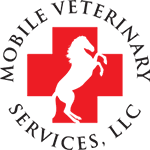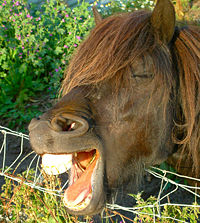Spring is the time of year in Colorado that many horse owners look forward to. Large mats of shedding hair wafting about in the breeze, sticking to every square inch of fleece that might be exposed. Getting your tack cleaned up for riding season now that you have hours (plural HOURS!) of daylight after you get out of work or school to ride. Working on some refresher training sessions before the show season, in case there is a little bit of rust.
All of these things are rites of spring for horse owners here in Colorado. But spring is also time to schedule your spring checkup visit with your friendly, neighborhood veterinarian! Vaccine boosters, deworming, an annual checkup, and even discussion on Body Condition Scoring are great reasons to make an appointment for your horse. Spring is also a great time to find out if your horse is due for some dental work.
Just like us, regular maintenance dental work is an important part of your horses’ overall health. Horses have teeth that continue to erupt throughout their lives, and this leads to bad malocclusions, fractured teeth, periodontal disease and even a loss of condition in horses that never have a dental procedure done. Most of us have heard of horses needing a dental “float” before (routine filing of the teeth to correct malocclusions and remove overly sharp enamel points from the horses’ cheek teeth), but do you know what the signs are that your horse may be overdue for a dental procedure? What type of things should trigger the thought that your horse could benefit from a dental equilibration or “floating”? At what age should your horse have their first dentistry performed?
Most horses benefit from having their first dental exam and float between 2 and 3 years of age. While there are some reasons to check them out earlier than this age, horses at 2 to 3 years are often beginning to go into training. Making sure that their “baby teeth” are coming in correctly as well as removing any sharp uncomfortable points can really help a young horse to focus on the training that they are receiving. Young horses have teeth that are softer, and erupt faster, than older horses. This means that they can quickly develop sharp points that cause behavioral problems.
In any horses, odd chewing motions, or problems eating are two signs that we see that could indicate the need for a dental exam. If your horse is a “sloppy eater” with grains and pelleted feeds, and they drop more feed than they eat, they could be having problems with uncomfortable bucchal ulcers (sores on the inside of the cheeks) caused by overly sharp enamel points on the cheek teeth.
Also, problems with the bit or bridle, and head shaking or resisting the rider during training can indicate that a horse is due for a float. Most pieces of tack cross the face at the exact place where horses are most likely to develop these painful bucchal ulcers. So reports of a horse “not liking” a bit or bridle, or reports of changing through different types of bridles or bits can be associated with dental or oral discomfort.
Always touch base with your equine veterinary dental expert and ask questions if it has been more than 2 years since the last procedure was performed. By taking care of this important component of preventative maintenance care, you can make sure that your equine partner has a long, healthy, and comfortable life.



